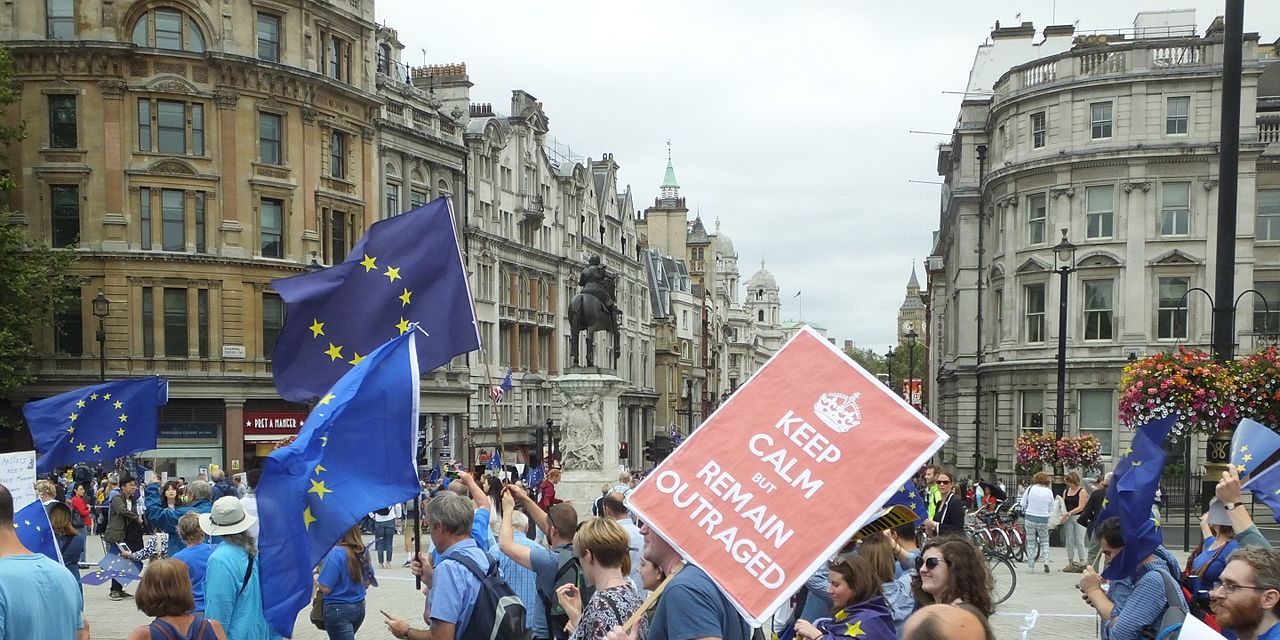 As the clock runs down on Article 50, a political crisis is looking increasingly likely. However, Iain Begg argues that this could become a more damaging constitutional crisis if Parliament is unable to settle how Brexit proceeds.
As the clock runs down on Article 50, a political crisis is looking increasingly likely. However, Iain Begg argues that this could become a more damaging constitutional crisis if Parliament is unable to settle how Brexit proceeds.
With barely five months to go until the 29 March deadline for the UK’s withdrawal from the EU, all eyes are on whether the two sides can cobble together a deal at one of the forthcoming European Council meetings this autumn. On the UK side, there is then to be a ‘meaningful’ vote in Parliament, while the European Parliament also has to approve the agreement and is broadly expected to do so. Intriguingly, a ruling from the European Court of Justice (ECJ) on whether the Article 50 process for leaving the EU can be withdrawn is also expected before the end of the year.
There has been feverish speculation in the UK about what will happen when the meaningful vote takes place. Will enough Conservatives oppose the government to block the deal? Will some Labour MPs defy their party whip to support the government, allowing it to squeak home? How much more money or what political concessions will have to be promised for Northern Ireland to keep the Democratic Unionist Party (DUP) on board?
The permutations are endless. The default expectation is that somehow the government will prevail, but there is a very real possibility that there will be no majority in the House of Commons for any of the options under consideration. What then? Clearly, the UK would face a major political crisis. The trouble is that, as the March 2019 deadline approaches, the constitutional process for what happens next is far from evident. Although much of the debate has been about what model for Brexit—Canada (with or without various plusses), Chequers, and so on—best captures the will of the people expressed in the referendum, the mechanism for delivering (or contesting) the form of Brexit cannot be neglected.
The UK is renowned for the flexibility of its system of governance, unencumbered as it is by a formal written constitution which prescribes how to proceed. Nevertheless, a political crisis could well become a constitutional crisis, because it has become unclear where power and responsibility now lie for dealing with Brexit. The roots of such a crisis lie in the authority vested by the UK political class in the result of the UK’s 2016 referendum on EU membership. Although formally an advisory vote, it has acquired a status of untouchability, captured in the tautology “Brexit means Brexit” and Theresa May’s repeated assertion of variants on “we are leaving the EU”. What has happened is that the doctrine of parliamentary sovereignty articulated by the 19th-century constitutional theorist, A.V. Dicey, has been supplanted by one of the sovereignty of the people.

Leaving aside the narrowness of the majority in the 2016 referendum and the fact that the 52 percent of voters who chose Brexit amount to just 37 percent of the electorate (29 percent did not vote) these are uncharted waters at a time of great political uncertainty. There is no simple roadmap for how to move on from the current impasse.
If the UK Parliament is unable to achieve a majority for whatever withdrawal deal the government puts to it, or to come up with a viable alternative, what happens next is unpredictable. Likely consequences might include the resignation of the prime minister and a vote of confidence. If only to preserve its own standing, a deeply split Conservative party might rally sufficiently to defeat such a vote, with a little help from the DUP, and try to stay in power with either a new leader or the present incumbent continuing to defy gravity. But it would be an even more precarious government, still at the mercy of the DUP, and the clamour for a general election would become deafening.
However, it is far from obvious that a general election would settle how Brexit proceeds. UK general elections almost invariably turn on how the electorate perceives the two main parties in relation to economic policy competence and the National Health Service. In the 2017 election, both these parties tacitly endorsed leaving the EU, but the result cannot be interpreted as decisive on the nature of Brexit. If the Labour Party were to campaign explicitly for remain in a further general election, as some are now hinting they would, it might translate into a clear choice for voters between hard Brexit and no Brexit. But the result could easily be a hung parliament or further ambiguity on Brexit.
Timing comes into all of this. The defeat of a Brexit deal in a meaningful vote before the end of 2018, followed by a general election, would see the uncertainty stretch into February, yet might still not permit a clear decision on what form of Brexit is pursued—if, indeed, it continues to be pursued. The only remaining constitutional mechanism would then be again to consult the people. A second referendum would take time, because it requires an act of Parliament, certain statutory checks and sufficient time for a campaign. Careful work by the Constitution Unit at University College London suggests it could be done faster than any previous UK referendum, but would still need a minimum of five months once Parliament agreed to go for it. Moreover, there is no consensus on what the question (or questions) would be in a further referendum. If it is a ‘yes/no’ question, permutations could include a re-run of the 2016 referendum on staying or leaving, or a choice between the withdrawal deal presented to Parliament and no deal. There could be a three-way question—remain, leave with deal, or leave with no deal—possibly using an alternative vote to enable voters’ second preferences to be counted.
Giving the final decision back to the people would require a postponement of the Article 50 deadline, allowed under the Treaty, but requiring the consent of both sides (the EU27 and the UK), and has a number of ramifications. This could lead to challenges for the EU side. Even as little as a three-month extension would raise interesting constitutional questions, not least whether there should be European Parliament elections in the UK in June 2019. Common sense might say ‘no’, and there is something of a precedent for the UK being excluded from EU27 meetings of (notably) the European Council, but the formal position might be different. Nigel Farage may yet have the opportunity to continue to rile his fellow MEPs.
Then there is the question of whether EU law would allow the UK to rescind its exit from the EU if the 2016 result were reversed. A case sent to the ECJ by the Scottish Court of Session, concerning whether Article 50 can be unilaterally withdrawn, is due to be heard on 27 November 2018. If the ruling is that it can be, it may encourage those who would like to see a postponement of the process, perhaps as a prelude to withdrawing it altogether. If the further resort to the people were to lead to an outcome perceived as contrary to what the 52 percent voted for in 2016, the outcry would be intense. Constitutionally, it would raise questions about the future role and status of such votes in UK democracy, whether on the EU (best of three?) or other topics. As Vernon Bogdanor, one of the country’s leading constitutional scholars, put it in an article in the Financial Times on 9 December 2016: “Our exit from the EU depends upon the continuing consent of the people. The notion of finality is quite alien to the spirit of democratic politics. For it must always remain open for a sovereign people to reassess its verdict”.
It is always possible that a rabbit will be pulled from the hat in the negotiations, leading to a Brexit deal that Parliament can accept. But if it does not, there is likely to be a constitutional morass, and that is a frightening prospect.
This article gives the views of the author, not the position of LSE Brexit or the London School of Economics. It first appeared on the Dahrendorf Forum.
Iain Begg is Professorial Research Fellow at the European Institute and Co-Director of the Dahrendorf Forum, London School of Economics and Political Science.







Unfortunately the UK/EU leaders are of mind of ” My way is best” and self selfish people rarely listen to others opinions. If we leave without an agreement the world will still revolve and survival will dictate how people/ business tell the UK/EU what they want their leaders to do. Whether the leaders pay any attention is how the leaders regard the will of their citizens. We live in a world of Dictators once they are voted or are invited into power.
The EU deal was illegal in the first place. No, deal. Severance and all our money back with interest.Or we go to war against our illegitimate government and elites. FULL STOP.
It’s worth remembering that when we talk about leaving with or without a deal, we’re talking about leaving with or without a withdrawal agreement, not a future trade deal. Whatever happens we ‘leave without a trade deal’ because we can’t reach one until after we’ve left.
The big issue about the ‘meaningful vote’ isn’t so much that it could be reduced to an non-amendable ‘yes/no’ choice, it’s that there’s nothing to have a vote about and no real sign of anything. Can parliament vote on something when not even the UK government have a settled policy? At best it will be a ‘meaningful vote’ on a statement of intent.
“Although formally an advisory vote, it has acquired a status of untouchability, captured in the tautology “Brexit means Brexit” and Theresa May’s repeated assertion of variants on “we are leaving the EU”. What has happened is that the doctrine of parliamentary sovereignty articulated by the 19th-century constitutional theorist, A.V. Dicey, has been supplanted by one of the sovereignty of the people.”
I don’t buy this. My layman’s understanding has always been that when the Queen and Parliament agree, they are in British, or at least English, law sovereign. When they agreed to hold the EU referendum this did not change. Of course if an Act were to be passed revoking Brexit it would be the law of the land. However it is not likely to happen because voters would take it out on MPs at the next election.
For me a constitutional crisis is one where there is disagreement about where legitimate authority is, like the start of the English Civil War. That’s not the case here.
This link from the Full Fact website clarifies whether the referendum was advisory or mandatory :
http://fullfact.org/europe/was-eu-referendum-advisory
The idea of parliamentary sovereignty is purely an assertion. Ultimately, the people are sovereign, they can be told they are not, but if you want a democracy, then its the people that matter.
People appoint politicians, politicians enact the Law. It starts with the people.
“its the people that matter” I wouldn’t disagree with that, but which people, and how do they express their wishes? I remember that one Aristophanes play had a character called “Thepeople” who told the politicians what to do, but in real life you have many millions of people who speak with different voices. That’s why you need constitutions.
You could argue that the supreme power in the UK lies with the Queen, who appoints or dismisses ministers at her pleasure. Or (as I said) with the Queen and Parliament, who enact legislation. Or with the Supreme Court, who have the last word in interpreting it. Or with the police officers who would, if necessary, have the job of ejecting a recalcitrant former PM from Downing Street. It’s all rather confusing.
If its not the people at the ballot box who are supreme, then its not democracy. In the UK they are literally fed the line that ‘Westminster’ is sovereign & for many people thats enough to convince them that they are powerless.
Ultimately, sovereignty belongs to those who assert it. Shhhh, don’t tell them.
This link from the Full Fact website clarifies whether the referendum was advisory or mandatory :
http://fullfact.org/europe/was-eu-referendum-advisory
The English can either have their Brexit or their Union but not both.
Time to choose.
With reference to the 37% of Leave voters, this situation is particularly galling for Scots. In 1979 a small majority of voters in Scotland voted for a Scottish Assembly. This majority did not achieve the 40% figure of the total electorate which was a requirement of the Act. The Act was subsequently repealed. An Assembly which would have had very limited powers was denied yet Brexit which will have a profound impact on the UK is chaotically progressing. Unlike, the Scottish referenda in 1979, 1997, 2014 there was clarity as to what Scots were voting for. As noted above, with 5 months to go, Leave Voters have yet to know what they actually voted for.
Could you clarify what would happen if the UK found itself in a situation where there was no Withdrawal agreement in place on March 29 AND the UK had a care taker government. Who would have the power to formally ask EU for a delay?
Thanks